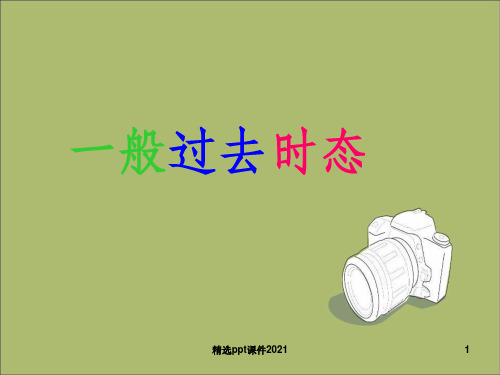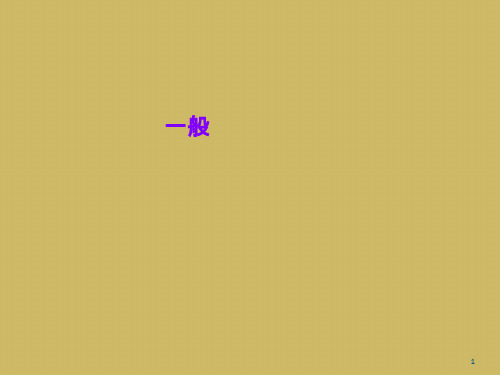颜世军--一般过去时课件
一般过去时(7张PPT)初中英语专项复习课件

易错点:
稿定PPT
(1)表示一系列的动作,尽管有先后,都稿用定一PP般T过,去海时量,素最材后持两续个动词之间用and连结。 He opened the door, rushed out and then disa更 总pp新 有ea, 一red上 款. 他千 适打款 合开模 你门板,选冲择了出去,然后就消失了。 (2)注意在语境中理解"我刚才/原来还不……"。
感谢观看
一般过去时 初中英语专项复习
一般过去时 构成:一般过去时用动词的过去式构成,其规则动词变化方法如下表所示:的状态。
情况 一般情况 以不发音的字母e结尾
以辅音字母 +y结尾
结尾只有一个辅音字母的重 读闭音节
构成方法
例词
加-ed
wash→washed help→helped
稿加定-PdPT
hope→hoped like→liked
一般过去时 (5)一般过去时有时可以表示现在,多与 want, hope, wonder, think, intend 等动词连用,使语气更委婉 。
I wondered if you could help me. 不知你能不能帮我一下。 有时用一般过去时也是时态一致的需要。 I didn’t know you were here. 我不知道你在这里。
He was here just now. 他刚才还在这里。 What did you do yesterday? 你昨天做了什么事?
(2)在过去一段时间内的经常性或习惯性稿动定作PP。T 稿定PPT,海量素材持续
We often played together when we were child更re新n.,我上们千小款时模候板常选在择一起玩。 总有一款适合你
一般过去时ppt课件

常用时间 常与一般过去时态连用的时间有:
yesterday yesterday morning (afternoon, evening…) last night (week, month, year…) two days ago, a week ago, three years ago… in 1990, (in 1998…)
/t/ /d/ 之后念/id/
说明:
1、清念 /t/ ,即 ed 在清辅音后面念 /t/ ,例:finished helped
passed cooked
2、元浊 /d/ ,即 ed 在元音,浊辅音后面念 /d/ ,
例:borrowed enjoyed
called moved
3、/t/ /d/ 之后念 /id/ , 即 ed 在 /t/ /d/ 音后面念 /id/
looked played started lived hoped used
stopped planned tripped
4、结尾是“辅音字母+y”的动词, study studied
先变“y”为“i”再加—ed
carry carried
精选ppt课件2021
4
规则动词词-ed的读音
清念 构成 读音
精选ppt课件2021
3
规则动词过去式的构成
构成规则
例词
1、一般在动词原形末尾加– ed
2、结尾是 e 的动词加 -- d
3、末尾只有一个辅音字母的 重读闭音节词,先双写这 个辅音字母,再加—ed
一般过去时(课件)

一般过去时(课件)一般过去时是英语中表达过去某个时间点或时间段发生的动作或状态的一种时态。
在一般过去时中,动词的形式需要根据主语的人称和数进行变化。
一般过去时的句型结构是:主语 + 动词过去式 + 其他。
一、一般过去时的构成1. 规则动词:在动词原形的基础上加上ed。
例如:work → worked, play → played, study → studied。
二、一般过去时的用法1. 表示过去某个时间点发生的动作。
例如:I went to the library yesterday.2. 表示过去某个时间段内发生的动作。
例如:We playedfootball last weekend.3. 表示过去某个时间段内的状态。
例如:She lived in New York for five years.4. 表示过去习惯性动作。
例如:He used to smoke when he was young.三、一般过去时的疑问句和否定句1. 疑问句:将助动词did放在主语之前,动词原形放在助动词之后。
例如:Did you watch the movie last night?2. 否定句:在主语和动词之间加上助动词did,动词原形变成动词的过去式,并在动词过去式前加上not。
例如:I didn't finish my homework yesterday.四、一般过去时的特殊用法1. 过去进行时:表示过去某个时间点正在进行的动作。
例如:What were you doing at 8 o'clock last night?2. 过去完成时:表示在过去某个时间点之前已经完成的动作。
例如:I had finished my work before he came.3. 过去完成进行时:表示在过去某个时间点之前一直在进行的动作。
例如:She had been waiting for two hours when he finally arrived.一般过去时(课件)一般过去时是英语中表达过去某个时间点或时间段发生的动作或状态的一种时态。
一般过去时.语法讲解ppt课件

精选ppt课件2021
一般过去时态
精选ppt课件2021
1
1. 含 义
一般过去时表示过去某个时间发生的 动作或存在的状态。常和表示过去的时 间连用。如last year,yesterday等. 我每天去上学。 我昨天去上学。 I went to school yesterday. 他每天下午都去打篮球。
他上星期一打篮球。
2.表示过去经常或反复发生的动作。
My father often went to work by bus last year.
When I was a child, I often listened to music.
精选ppt课件2021
3
3.表示已故人所做的事情。
Comrade Lei Feng did good deeds in his life.
精选ppt课件2021
2
2. 用 法
1.表示过去某个时间发生的动作或存在的状态。 He was here yesterday. I got up at six thirty yesterday morning. My father was at work yesterday afternoon. Did you have a good time last summer?
6.行为动词一般过去时的疑问式
一般过去时的一般疑问式在句首加助动词did Did+主语+动词原形……?
They f_in_i_sh_e_d_(finish) their work at four. 一般疑问句:
_D_i_d_ they _f_in_i_sh_ their work at four? Yes, they _d_id___. No, they _d_id_n_’_t.
一般过去时ppt课件

T
2.简略回答用助动词did/didn’t代替
行为动词。
Did he find the boy yesterday?
-Yes, he did.
-No, he did not (didn’t).
28
写出下列动词的过去式
1. look looked 11. go
went
2. live lived
12. have has
morning
yesterday afternoon
evening
the day before yesterday 25
4.与one 连用: morning
one
evening day
Monday afternoon
5.与that 连用:
that
morning winter day year
26
6.其他时间状语:
4.What time diydou ( geett) to school this
morning?
5.Jim di(ddo) a lot yesterday. He (go)
swhoepnpt ing and
(cook) csouopkpedr.
31
1.Lucy did her homework at home.
Does he go to school by bus every day?
Did he gtoo school by bus yesterday?
don’t/ doesn’t
didn’t
do/ does
did 10
谓语构成
1.动词 be
was , were
2.动词 have, has
一般过去时讲解PPT课件

did
助动词,用于构成一般过去时的 疑问句和否定句。
主语
句子中的动作执行者,可以是名 词、代词等。
例如
What did you do yesterday? 你 昨天做了什么?
其他成分
包括宾语、状语等,根据句子需 要而定。
动词原形
指动词的基本形式,即不加任何 时态或语态标记的形式。
特殊疑问句实例分析
when、after、 before、as等引导的 表示过去的时间状语 从句。
已经、曾经、刚才、 那时等表示过去的时 间副词。
02
一般过去时肯定句结构
主语+动词过去式+其他成分
01
02
03
主语
句子中的主体,可以是人 、物或抽象概念。
动词过去式
表示过去某个时间里发生 的动作或状态。动词的过 去式可分为规则变化和不 规则变化两种。
表示过去某个时间里发生的动 作或状态。
用法
陈述过去的事实或情况,描述 过去经常或反复发生的动作。
现在完成时
表示过去发生的动作对现在造 成的影响或结果,或从过去已 经开始,持续到现在的动作或 状态。
用法
强调过去与现在的联系,表达 一个动作从过去一直延续到现
在。
两者在时间状语上的区别
01
02
03
04
一般过去时
一般过去时讲解PPT课件
目录 Contents
• 一般过去时基本概念 • 一般过去时肯定句结构 • 一般过去时否定句结构 • 一般过去时疑问句结构 • 一般过去时特殊疑问句结构 • 一般过去时与现在完成时的比较
01
一般过去时基本概念
定义与作用
定义
一般过去时表示过去某个时间里 发生的动作或状态。
一般过去时课件(PPT) ppt课件

实意动词一般过去时的否定式
一般过去时的否定式是在主语后加 助动词did not (didn’t).
主语+didn’t+动词原形
I _to_l_d_ (tell) them the news yesterday. I 2020/10/22 _d_id_n_’t__t_e一般l_过l去_时课件t(PhPTe) m the news3.4
A. I am
B. I was
C. Yes, I was D. No, I wasn't
2020/10/22
一般过去时课件(PPT)
21
am 一、用be动词的适当形式填空
1. I _______ at school now.
was 2. He ________ at the camp last week. were 3. We ________ students two years ago. were 4. They ________ on the farm a moment ago. was 5. Yang Ling ________ eleven years old last year. was 6. There ________ an apple on the plate yesterday. was 7. There ________ some milk in the fridge yesterday. was 8. The mobile phone _______ on the sofa yesterday evening.
--- Yes , he was .是的,他在
--- No , he wasn’t . 不,他不在。
2020/10/22
一般过去时课件(PPT)
一般过去时公开课优秀课件pptx

一般过去时适用于描述过去的经历、事件或 故事,而将来时适用于预测、计划或表达意 愿等语境。
05 一般过去时在句子中的运用
在简单句中的运用
01
表示过去某个时间里发生的动作或状态。
02
例句:Yesterday, I went to the park. (昨天我去了公园。)
03
表示过去习惯性、经常性的动作或行为。
课程总结
回顾本节课的重点和难点,鼓 励学生在日常生活中积极运用 一般过去时进行交流
02 一般过去时基本概念
定义及作用
定义
一般过去时表示过去某个时间里发 生的动作或状态。
作用
用于描述过去发生的事情,表达过 去的经历、状态或情感。
构成形式
01
was/were + 动词的过去分词(用 于第一、三人称单数和第二人称)
试使用英语进行交流和表达。
鼓励同学们多读书、多看电影、 多听音乐,不断拓展自己的视野 和知识面,提高自己的跨文化交 际能力。
期待在下一次的课程中与大家再 次相聚,共同探讨英语学习的乐 趣和奥秘。
THANKS
提高学生的口语和书面表达能力,使其能够准确运用一般过去时描述过去发生的事 情
培养学生的语言综合运用能力和自主学习能力
教学目标与要求
知识目标
掌握一般过去时的基本形式和用 法,了解其与现在时、将来时的
区别和联系
能力目标
能够运用一般过去时描述过去发生 的事情,表达自己的观点和态度
情感目标
培养学生对英语学习的兴趣和热情, 提高其跨文化交际意识和能力
01
能够正确理解和运用一 般过去时的句子结构和
语序
03
在口语和书面表达中能 够更自如地运用一般过
- 1、下载文档前请自行甄别文档内容的完整性,平台不提供额外的编辑、内容补充、找答案等附加服务。
- 2、"仅部分预览"的文档,不可在线预览部分如存在完整性等问题,可反馈申请退款(可完整预览的文档不适用该条件!)。
- 3、如文档侵犯您的权益,请联系客服反馈,我们会尽快为您处理(人工客服工作时间:9:00-18:30)。
Choose the right answers.
1. --- How __________ your vacation? --- It was pretty good. A. was B. were C. did 2. --- Where __________ they go yesterday? --- They went to the Summer Palace. A. are B. do C. did 3. --- Where did you go on vacation? --- I __________ my grandma. A. visit B. visited C. visits
陈述句:He was at home yesterday. 否定句:He wasn’t at home yesterday.
疑问句:Was he at home yesterday?
Yes, he was./ No, he wasn’t.
行为动词的一般过去时: 陈述句:主语+动词过去式+其它 I go to the movie. →I went to the movie.
一般过去时
构成 动词的过去式 1. 表示过去某个时间发 生的动作或存在的状态。 2. 表示过去经常或 反复发生的动作。 (the day before) yesterday last night / week in 1990 / just now On Sunday morning two days ago
like—liked
dance—danced
name—named
(3) 以一个辅音字母加一个元音字母加一个辅音 字母结尾的并且最后一个音节重读的单词,要先 双写这个辅音字母,再加-ed。
e.g. stop—stopped
drop—dropped
plan—planned
(4) 以辅音字母加y结尾的单词,先改y为i,再加ed。 e.g. study—studied carry—carried 不规则变化需要按一定的规律逐个记忆。
一般过去时
用法
常用时间
规则动词
动词过去式
的构成
regular verbs
不规则动词 irregular verbs
1. 动词be的变化:
am
is
was
are
were
2. 助动词do的变化: do→ did (在过去时里助动词did没有人称和数 的变化) 如:Did you play soccer yesterday? Did he play soccer yesterday?
3. There was some orange in the cup.(变一般疑 问句) Was there _______ any orange in the cup? _______
4. Frank read an interesting book about history. (一般疑问句) read an interesting book _______ Did Frank _______ about history?
clean
play practice stop do
cleaned played practiced stopped
stay
visit study plan have
stayed visited
studied planned
had
did was
am / is
go
went
句子构成:系动词be的过去时. am (is) →was are →were
3. 实义动词的变化: 实义动词分规则变化和不规则变化。 规则变化有以下几种: (1) 一般情况下在动词后加-ed。 e.g. play—played visit—visited walk—walked clean—cleaned
(2) 以不发音的e结尾的词,在词尾加-d。
e.g. note—noted
否定句:主语+助动词didn’t+动词原形+其它
I don’t go to school today. →I didn’t go to school.
一般疑问句:Did +主语+动词原形+其它
Do you have breakfast? →Did you have breakfast? Yes, I do./ No, I don’t. Yes, I did./No, I did mountains 4. They all ________ yesterday morning. visit (not visit) her aunt last 5. She didn’t _________ weekend. did stayed She ________ (stay) at home and _________ (do) some cleaning.
4. --- Did she __________ to the movies? --- No. She went to the party. A. goes B. go C. went 5. Betty stayed at home and ________ for the test last weekend. A. study B. studies C. studied 6. --- __________ your mother go fishing? --- No, she didn’t. She went shopping. A. Does B. Is C. Did
Fill in the blanks with the right form of each word.
had (have) an exciting party last 1. I _________ weekend. Did she _________ practice (practice) the 2. _________ guitar yesterday? No, she _________. didn’t 3. What ________ Tom ________ (do) on did do Saturday evening? read (read) He ________(watch) TV and ________ watched an interesting book.
Change the sentences.
1. Lucy did her homework at home.(改否定 句) do her homework at Lucy ________ didn’t _______ home. 2. He found some meat in the fridge(冰箱). (变一般疑问句) ___________ he __________ ___________ Did find any meat in the fridge?
Past 过去
went to the movies did my homework
played tennis played soccer
Now 现在
go to the movies
do my homework
play tennis
play soccer clean the room
cleaned the room
